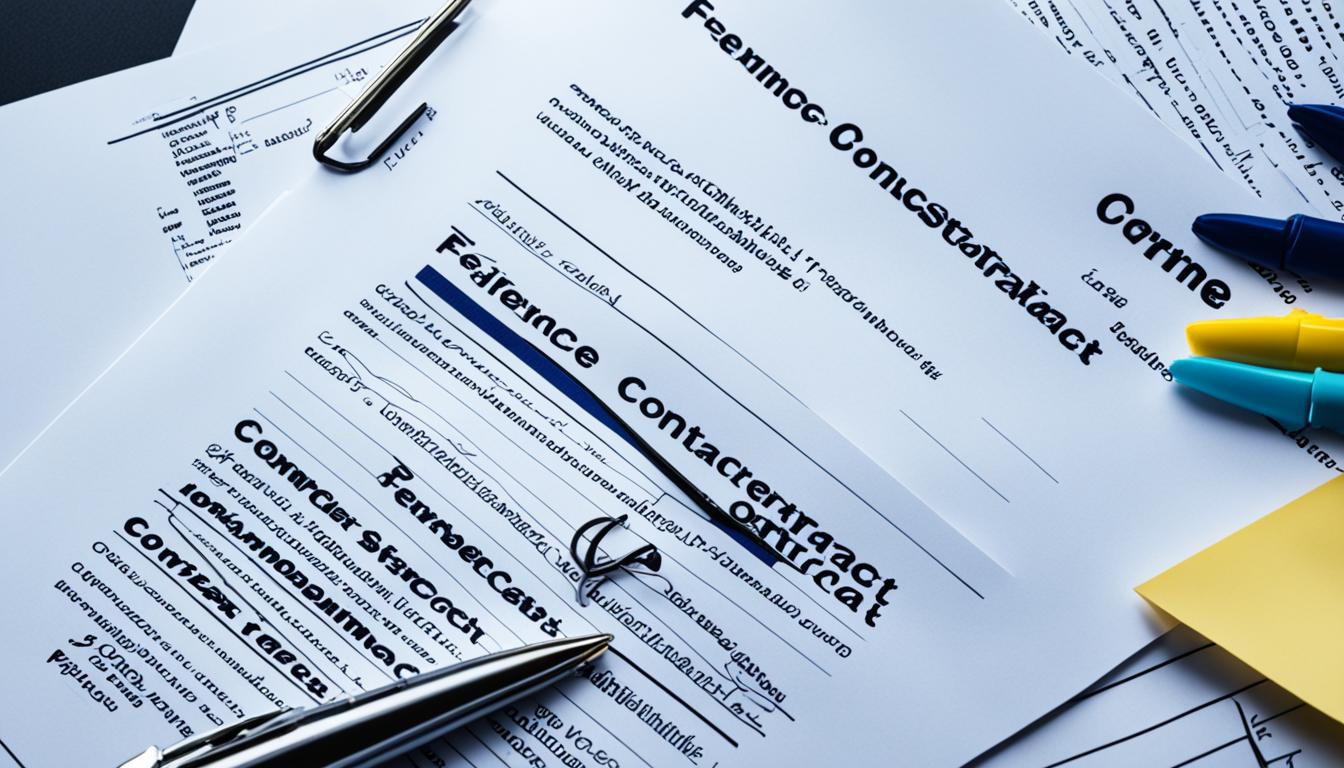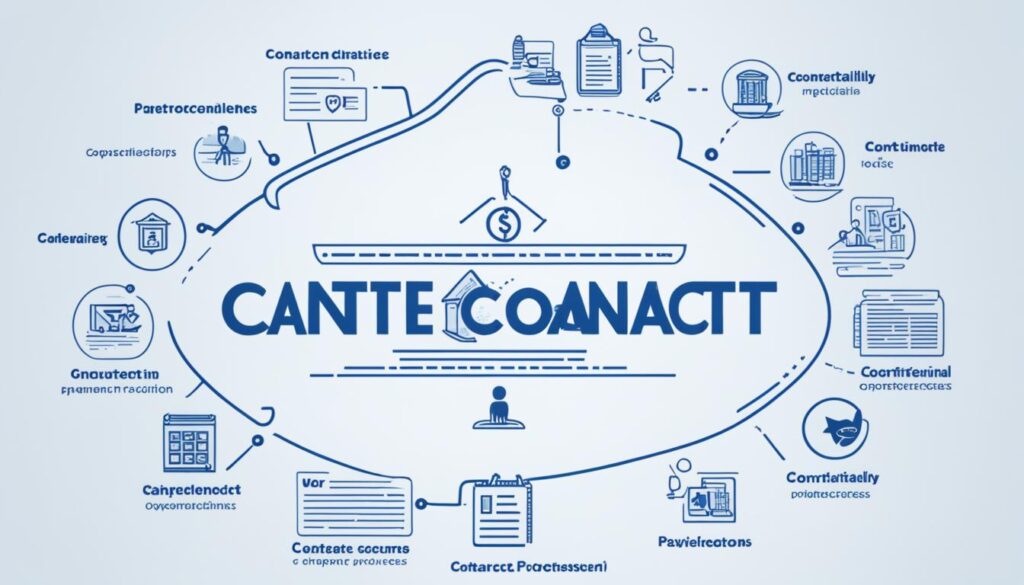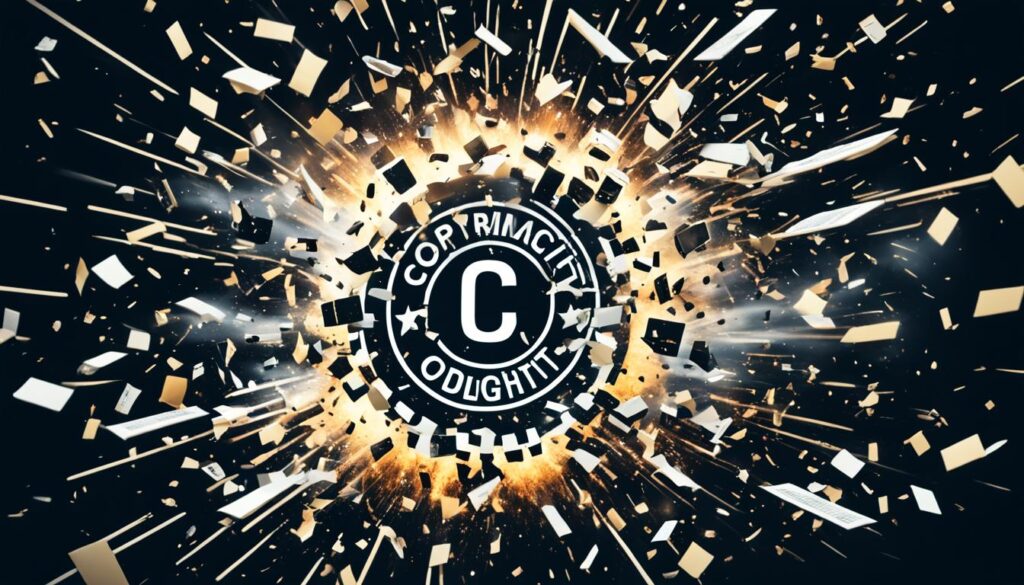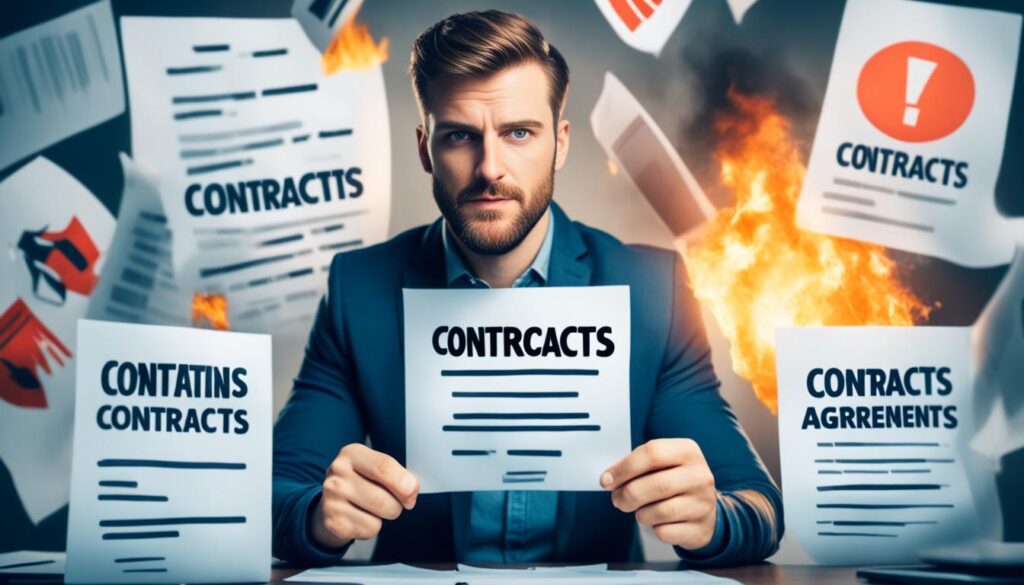Physical Address
304 North Cardinal St.
Dorchester Center, MA 02124
Physical Address
304 North Cardinal St.
Dorchester Center, MA 02124

Safeguard your intellectual property as a freelancer by utilizing comprehensive contracts that outline scope of work, payment terms, copyright ownership, and dispute resolution.
Did you know that 96% of freelancers see contracts as vital for their work? They help outline what needs to be done and stop issues like non-payment. As a freelancer, what you create is very valuable. It’s important to protect it. Contracts are key in legal terms. They safeguard your ideas, set out what you will do, and make sure you get paid properly. They are critical for good relationships with clients.
Creating and sticking to a contract might seem hard for some. But, the advantages are big. A good contract should include things like the right to show your work in your portfolio, and when and how you get paid. It also should limit extra work without pay. By making your contract detailed and clear, you keep your business safe. As your freelance work grows, updating your contract is essential to stay legally strong.
Freelance contracts are key for legal safety and maintaining a good partnership between a freelancer and a client. They outline what each party expects. This helps to build trust and honesty, and keeps the freelancer’s rights safe. Lack of a contract can lead to problems like not getting paid, work being used without permission, and deadlines not being met.
These contracts are laws between both sides. They lower the chance of arguments about the deal’s details.
Before starting any project, freelancers often ask clients to agree to a contract. This step is vital to build trust and ensure clear communication. Such agreements make everything clear, from tasks to payments and timelines. This cuts down on the chances of disagreements.
Freelancers might have dealt with bad situations such as disputes over pay, work being used wrongly, or deadlines being broken. Using contracts can prevent many of these issues. They give a strict plan for the project, payments, and deadlines. This helps both the freelancer and the client legally.
Having a freelance contract is crucial for protecting the freelancer. These documents cover things like personal info, project details, what’s to be delivered, when, and who owns the final work. They also sort payment terms and what to do if the deal ends early. This ensures the freelancers’ interests stay safe all through the job.
Having a good freelance contract is key to a successful project. It should protect both the freelancer and the client. This ensures the work goes smoothly and is a win-win for everyone.
The contract needs to have the full names and details of both the freelancer and client. This info helps make sure everyone knows who is doing what and can talk easily. It’s key for smooth project progress.
It’s very important to clearly outline what work will be done. This section sets out the role of the freelancer and the client, making expectations clear. Everyone knows their part because of this.
What needs to be done and when? That’s what you figure out in this part. Defining the project’s steps and dates helps keep everything on track. It helps avoid confusion and keeps the project moving forward.
This part talks about who owns the work in the end. It’s a big deal for jobs that involve a lot of creativity. It tells you if the freelancer or client can do what they want with the work later.
How and when the freelancer gets paid is explained here. It includes the amount, when payments are due, and more. This part helps make sure the freelancer gets their money fairly and on time.
There should be a way out in the contract if things don’t work out. This clause explains when and how the contract can end. It can prevent a small issue from turning into a big problem.
With these terms in the contract, both freelancers and clients know what’s expected. It protects everyone’s rights and helps avoid arguments. This is true from start to finish of the project.

As a freelancer, you’ll see secret client info like customer lists and company plans. Non-disclosure agreements (NDAs) in your contract keep this info safe. An NDA is a contract that says what you can’t share with others. It makes sure both you and the client keep confidential things secret.
Many freelancers get asked to sign an NDA before they start a job. In fact, 74.7% of them say it’s a common request. It’s even more common in jobs like SAP, where 87.5% have signed one.
NDAs usually don’t last forever, just until a project is over or a product is out. They’re a way for clients to keep their secrets and trust freelancers. But, it’s smart for freelancers to have a lawyer look at these agreements. Making sure they’re fair and clear is really important.
| Freelance Industry | Percentage Asked to Sign NDA |
|---|---|
| SAP Field | 87.5% |
| Creative Industry (Graphic, Content, Design) | 84.6% |
Adding an NDA to your work agreements can keep important info safe. It shows your clients you take their privacy seriously. By getting the right information and knowing how NDAs work, you can make your freelance work better and trustful.
People who create such as writers, designers, and photographers must know how to keep their intellectual property safe. Copyright law is key. It protects original creative works. This includes literary works, music, and even architectural designs.
The fair use doctrine allows some use of copyrighted work without permission. This includes criticism, commentary, and news reports. But, knowing what’s fair use can be tricky. It’s often decided case by case.
Copyright law safeguards things like photos, writing, and videos. If you want to protect names, logos, or taglines, you need trademark law. More unique creations, like custom designs or secret formulas, might also be protected by patents or kept as trade secrets. They can help businesses stay ahead.
The fair use doctrine allows some use of copyrighted work without permission. This includes criticism, commentary, and news reports. But, knowing what’s fair use can be tricky. It’s often decided case by case.

Understanding what “work for hire” means is key for freelance workers. It means the person who hires you owns the work you create. But, you could still own it if you set up your contract right.
If you’re a freelancer, you can keep the rights to your work by making sure it’s in your contract. This lets you control your work and possibly make more money by licensing it.
Another choice is to let your client use your work through a license, while you keep the copyright. This way, you can earn from your work and keep your rights as the creator.
| Concept | Duration | Key Considerations |
|---|---|---|
| Copyright Ownership | Life of the author plus 70 years | Automatic for original creative works, but can be transferred or licensed |
| Patents | 20 years | Provide exclusive rights to profit from inventions for a limited time |
| Work for Hire | Varies | Copyright belongs to the commissioning entity, not the individual creator |
Freelance contracts are the backbone in safeguarding a freelancer’s work. They spell out clear terms to dodge disputes. This ensures payment is fair and secure the freelancer’s rights. These contracts touch on work details, due dates, how much you’ll get paid, and who owns the work. They build trust and understanding between you and the client.
Some freelancers skip contracts if they’ve not had any trouble. But, this is risky as it can lead to being taken advantage of. Without a contract, you could face issues like not getting paid or delays, work being taken without permission, or deadlines being missed.
A good contract includes names, what the project is, what you promise to deliver, when you’ll finish, who owns the work, how much you’ll be paid, and what happens if you need to end the deal. It might also have an NDA to keep your client’s private info safe. It’s a smart move to get a lawyer to look over the contract before you both sign it. This helps make sure your agreement is solid and legal.

Being a freelancer means it’s key to get the best contract terms. This keeps your rights safe. It also helps you earn more and boosts your rep in your field. When you’re negotiating, focus on:
Make sure you can include your work, even if someone else wrote it, in your portfolio. This shows what you can do. It helps open doors to new work and makes clients trust you more.
Set how many meetings or calls are included, with charges for more. This stops projects from growing too much and makes sure your time is well paid for.
For retainers, work out how long you can keep unused hours. So, you get paid for everything you do. It also helps you plan your time better.
Decide on the max hours for each job, with costs for more time. This stops extra work from eating into your pay unfairly.
Look into payment terms that don’t rely on client approval. Get upfront payments to keep your cash flow steady. This makes sure you’re paid on time for your hard work.
With the right contract terms, freelancers can work more freely. They cut down on risks and build strong, win-win partnerships with their clients.

Freelance contracts change over time. This is because new issues and situations come up. Freelancers need to be ready to update their contracts. They do this to keep themselves safe in the future. This might mean adding new clauses or changing the contract to fit what the freelancer wants. By doing this, freelancers make sure their contracts are up-to-date and useful.
The freelance industry is growing fast. In 2018, about 56.7 million Americans were freelancing. More and more freelancers are finding work in the U.S. This growth makes having up-to-date contracts very important. Freelancers need contracts that can deal with new problems and protect their interests.
On average, a freelancer in the U.S. makes $31 per hour. But, this can vary from $20 to $40 an hour, depending on the job. Still, many freelancers worry about getting paid. Almost half of them are concerned about this. About 60% have had issues with late or no payments. By updating their contracts, freelancers can add rules about payments. They can also include clauses about what happens if a client doesn’t pay on time.
With most freelancers not using contracts, updating them is key. Those who have contracts are more likely to be paid. This shows that adjusting contracts as needed is very important. It helps freelancers get paid and protects their work.
In the last few years, freelance contracts have gotten more detailed and filled with legal terms. Making changes to contracts can help with issues like who owns the rights to work, or what happens if there are extra job tasks. This way, freelancers can protect themselves and their work.
Being on top of contract changes is good for freelancers. It keeps their agreements clear and fitting to their needs. This helps the relationship with clients. It avoids problems and makes sure the freelancer’s work and ideas are safe.
Freelance contracts are important, binding agreements. This makes it smart for freelancers to seek legal advice when they make or read these contracts. An attorney can help protect important things like your ideas, negotiate well for you, and make sure the contract will be followed.
Seeing a lawyer might cost some money upfront. But, it often means you avoid future, expensive legal fights. So, it’s a good move for freelancers when starting to work with clients.
| Statistic | Value |
|---|---|
| Percentage of freelancers who may be considered the owners of copyright for their work by default unless stated otherwise in a contract | – |
| Ratio of cases where clients may own the rights to a freelance project despite the freelancer holding the copyright | – |
| Percentage of freelancers who register their work with a copyright office for additional legal protection | – |
| Frequency of legal consultations sought by freelancers regarding copyright and ownership matters | – |
Freelancers often deal with tough clients or disagreements on work quality. It’s key to get legal advice to protect their efforts. This step helps in keeping things fair and avoids future problems in writing work.
“Contracts are a critical matter for freelance writers, as they outline work scope, payment terms, and deadlines. Knowledge about copyrights is vital to prevent work from being used without permission or compensation.”
Freelancers need to handle their taxes well. Knowing what business expenses you can write off can help you keep more of what you earn. While running into legal trouble is not common, it’s important to have a lawyer ready. They can offer help when needed.
Picking the right type of business, like an LLC, can affect your taxes and personal risks. This decision benefits from legal advice.
Choosing the right lawyer with freelance experience is important. It’s also good to understand the costs involved in getting legal help in the writing business.
If someone uses a freelancer’s work without asking, that’s against the law. This misuse can involve copying, sharing, showing in public, or performing the work. The freelancer can first send a cease and desist letter. This letter tells the person to stop using the work. If this doesn’t work, legal action like suing might follow.
A solid freelance contract is key in such situations. It clearly states how the work can and can’t be used. This makes it easier to show any misuse. It also helps in protecting the freelancer’s work.
| Key Copyright Infringement Statistics | Percentage |
|---|---|
| Freelancers who are the default owners of the copyright for their work | 70% |
| Freelancers who explicitly address ownership rights in their contracts | 40% |
| Freelancers who register their work with a copyright office | 25% |
| Freelancers who seek legal advice on copyright or ownership matters | 60% |
Understanding your legal rights is crucial. So is proactively protecting your work. With a strong contract and legal steps when needed, freelancers can defend their creativity and intellectual property. This approach is effective in resolving copyright infringement problems.
Freelance contracts help protect a freelancer’s work and rights. They make sure everyone agrees on the project terms. This builds trust and understanding between the freelancer and client. It’s important to include project details, deadlines, payment terms, who owns the work, and how the contract can end.
It’s smart for freelancers to add non-disclosure agreements and get good contract deals. They should also seek legal advice to ensure their contracts are strong. With a solid contract, freelancers protect their creative work and interests. A strong conclusion in a contract is key for safeguarding a freelancer’s rights and interests.
Our conclusion shows how important freelance contracts are. They protect a freelancer’s work, ideas, and rights. By spelling out the main points, these contracts create trust and clear communication. This ensures the freelancer’s work and interests are safe.